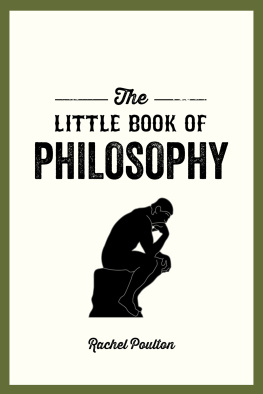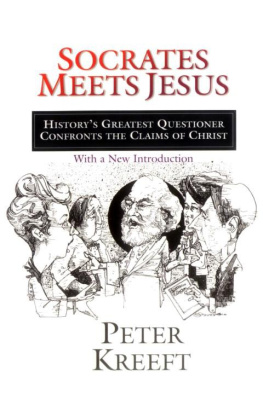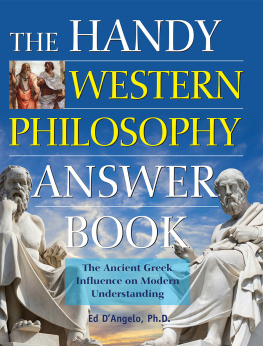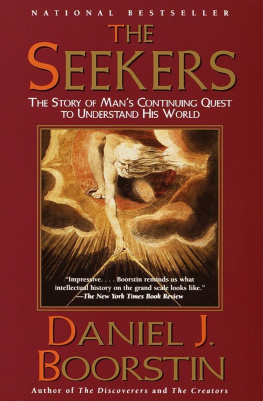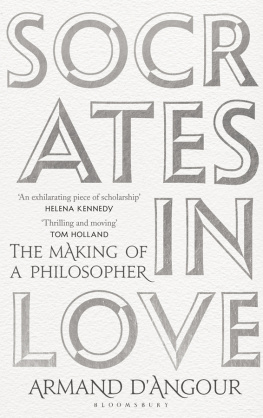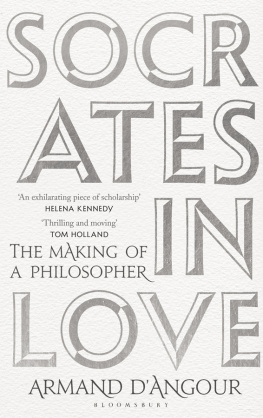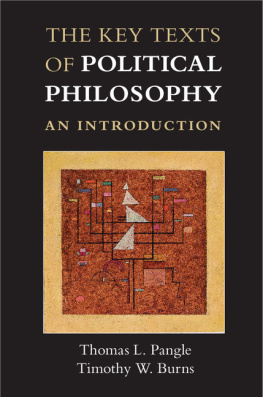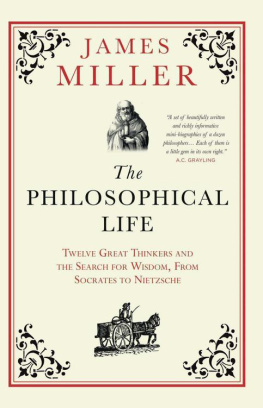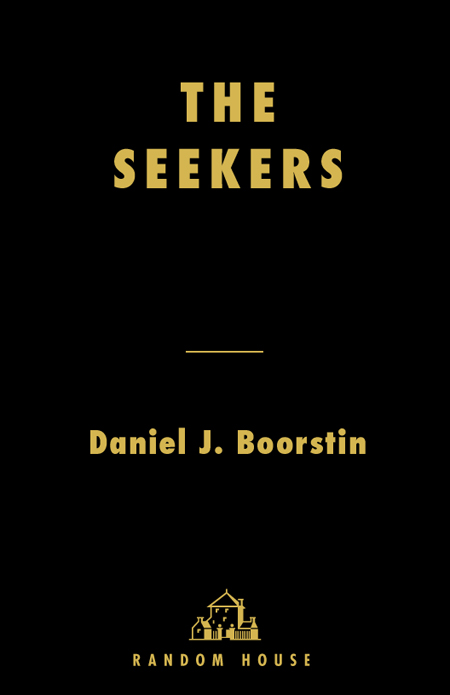
THE SEEKERS
THE STORY OF MANS CONTINUING
QUEST TO UNDERSTAND HIS WORLD
DANIEL J. BOORSTIN
The road is always better than the inn.
CERVANTES

RANDOM HOUSE NEW YORK
CONTENTS
AN ANCIENT HERITAGE
The Way of Prophets: A Higher Authority
From Seer to Prophet: Moses Test of Obedience
A Covenanting God: Isaiahs Test of Faith
Struggles of the Believer: Job
A World Self-Explained: Evil in the East
The Way of Philosophers: A Wondrous Instrument Within
Socrates Discovery of Ignorance
The Life in the Spoken Word
Platos Other-World of Ideas
Paths to Utopia: Virtues Writ Large
Aristotle: An Outsider in Athens
On Paths of Common Sense
Aristotles God for a Changeful World
The Christian Way: Experiments in Community
Fellowship of the Faithful: The Church
Islands of Faith: Monasteries
The Way of Disputation: Universities
Varieties of the Protestant Way: Erasmus, Luther, Calvin
COMMUNAL SEARCH
Ways of Discovery: In Search of Experience
The Legacy of Homer: Myth and the Heroic Past
Herodotus and the Birth of History
Thucydides Creates a Political Science
From Myth to Literature: Virgil
Thomas Mores New Paths to Utopia
Francis Bacons Vision of Old Idols and New Dominions
From the Soul to the Self: Descartess Island Within
The Liberal Way
Machiavellis Reach for a Nation
John Locke Defines the Limits of Knowledge and of Government
Voltaires Summons to Civilization
Rousseau Seeks Escape
Jeffersons American Quest
Hegels Turn to The Divine Idea on Earth
PATHS TO THE FUTURE
The Momentum of History: Ways of Social Science
A Gospel and a Science of Progress: Condorcet to Comte
Karl Marxs Pursuit of Destiny
From Nations to Cultures: Spengler and Toynbee
A World in Revolution?
Sanctuaries of Doubt
All History Is Biography: Carlyle and Emerson
Kierkegaard Turns from History to Existence
From Truth to Streams of Consciousness with William James
The Solace and Wonder of Diversity
The Literature of Bewilderment
A World in Process: The Meaning in the Seeking
Actons Madonna of the Future
Malrauxs Charms of Anti-Destiny
Rediscovering Time: Bergsons Creative Evolution
Defining the Mystery: Einsteins Search for Unity
For RUTH
A Personal Note to the Reader
As long as theres no find, the noble brotherhood will last.
Woe, when the piles begin to grow!
B. Traven, The Treasure of the Sierra Madre
Caught between two eternitiesthe vanished past and the unknown futurewe never cease to seek our bearings and our sense of direction. We inherit our legacy of the sciences and the artsworks of the great Discoverers and Creators, the Columbuses and Leonardos and Shakespearesrecounted in my two earlier volumes. We glory in their discoveries and creations. But we are all Seekers. We all want to know why. Man is the asking animal. And while the finding, the belief that we have found the Answer, can separate us and make us forget our humanity, it is the seeking that continues to bring us together, that makes and keeps us human. While this brief volume does not aim to survey the history of philosophy or of religion, it does sample ways of seeking by great philosophers and religious leaders in the West. This is a story not of finding but of seeking. I have chosen those Seekers who still speak most eloquently to me, and whose paths toward meaning in our lives and in our history still invite us on our personal quest.
Our Western culture has seen three grand epochs of seeking. First was the heroic Way of Prophets and Philosophers seeking salvation or truth from the God above or the reason within each of us. Then came an age of communal seeking, pursuing civilization in the liberal spirit, and then most recently an age of social sciences, when, oriented toward the future, man seems ruled by forces of history. We draw on all these ways in our personal search. They still speak to us, not so much for their answers as for their ways of asking the questions. In this long quest, Western culture has turned from seeking the end or purpose to seeking causesfrom the Why to the How. Might this empty meaning from our human experience? Then how can we recapture and enrich our sense of purpose?
The plan of this volume as a whole is chronological. But in detail it has a shingle scheme. Each of the three books overlaps chronologically with its predecessor, as the story advances from antiquity to the present. This, too, is a story without end, as we continue to explore our humanity in the eternal Why. And we see how we have come from seeking meaning to finding meaning in the seeking.
Copyright 1998 by Daniel J. Boorstin
All rights reserved under International and Pan-American Copyright Conventions.
Published in the United States by Random House, Inc., New York.
Grateful acknowledgment is made to the following for permission to reprint previously published material:
American Bible Society: Excerpts from the Todays English Version (TEV) Bible, 2nd Edition. Copyright 1992 by American Bible Society. Reprinted by permission of the American Bible Society.
Fourth Estate Ltd: Excerpts from A Kierkegaard Reader, edited by Roger Poole and Henrik Stangerup. Copyright 1989 by Roger Poole and Henrik Stangerup. Reprinted by permission of Fourth Estate Ltd.
Boorstin, Daniel J. (Daniel Joseph), 1914
The seekers: the story of mans continuing quest to understand his world / Daniel J. Boorstin.
p. cm.
Includes bibliographical references and index.
CivilizationHistory. 2. Meaning (Philosophy)History. 3. Meaning (Philosophy)Religious aspectsHistory. I. Title.
CB151.B66 1998
909dc21 98-15430
Random House website address: www.randomhouse.com
This book is also available in print as ISBN.
eISBN: 978-0-679-46270-5
v3.0_r2
BOOK THREE
PATHS TO THE FUTURE
Many discoveries are reserved for the ages still to be.... The world is a poor affair if it does not contain matter for investigation for the whole world in every age.
SENECA, NATURAL QUESTIONS
Theories thus become instruments, not answers to enigmas in which we can rest.
WILLIAM JAMES, PRAGMATISM
Just as Western Seekers discovered their power and duty to build civilization and so fulfill the common mission of humanity, they invented a new science of history. As the Age of Discoverers had found in America realms of experiment and self-government, so the Age of Science produced new views of historical forces that carried along men and societies. They invented historicism, a theory that events were determined by conditions beyond individual human control, and they snatched history away from God and from community, in a modern version of prophecy. Again, they sought solace in the future. Ideology, reinforced by the social sciences, gave people a new view of the extent and limits of their control. Dogmas of the way the world was destined to work overcame the liberal way of communal seeking. Religious faith retreated before the certitudes of science. And these stirred Seekers to find sanctuaries of doubton the way to make the seeking itself a source of meaning.


